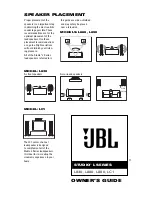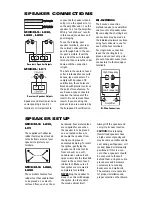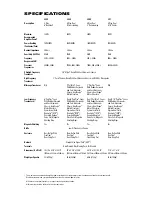
MODELS: L830,
L880, L890
Receiver’s Speaker Outputs
MODEL: LC1
Receiver’s Speaker Outputs
Speakers and electronics have
corresponding (+) and (–)
terminals. It is important to
connect both speakers identi-
cally: (+) on the speaker to (+)
on the amplifier and (–) on the
speaker to (–) on the amplifier.
Wiring “out of phase” results
in thin sound, weak bass and
poor imaging.
To use the binding-post
speaker terminals, unscrew
the colored collar until the
pass-through hole in the cen-
ter post is visible. Insert the
bare end of the wire through
this hole; then screw the collar
down until the connection
is tight.
The hole in the center of each
collar is intended for use with
banana-type connectors. To
comply with European CE
certification, these holes are
blocked with plastic inserts at
the point of manufacture. To
use banana-type connectors
requires the removal of the
inserts. Do not remove these
inserts if you are using the
product in an area covered by
the European CE certification.
BI-WIRING
The bi-wire connection
method requires one amplifier
and two sets of speaker wires.
By removing the shorting bars,
connections may be made to
the individual network sections
using four conductors, one for
each of the four terminals.
For single-wire connection,
leave the shorting bars in
place and connect only a sin-
gle set of speaker wires (two
conductors) to the two upper
terminals.
Bi-Wire Connections
–
+
–
+
–
+
Amplifier
High Frequency
Low Frequency
–
+
–
+
–
+
–
+
–
+
Receiver’s Speaker Outputs
LEFT
LEFT
RIGHT
RIGHT
–
+
SPEAKER CONNECTIONS
MODELS: L830,
LC1
The supplied self-adhesive
rubber feet may be attached
to the bottom corners of your
speakers to protect your
furniture.
MODELS: L880,
L890
These models feature four
rubber feet that enable them
to be placed on a smooth-
surfaced floor, such as tile or
hardwood. Four metal spikes
are supplied for use when
the speaker is to be placed
on a carpeted surface, to
decouple the speaker from
the floor and prevent
unwanted damping. To insert
the spikes, gently lay the
speaker on its side (not its
front or back) on a soft,
nonabrasive surface. Each
spike screws into the threaded
insert in the center of each
rubber foot. Make sure all
four spikes are screwed in
completely for stability.
NEVER
drag the speaker to
move it, as this will damage
the spikes, the feet and/or
the wood cabinet itself.
Always lift the speaker and
carry it to its new location.
CAUTION:
Floorstanding
(tower) loudspeakers have
a high center of gravity and
may become unstable and tip
over during earthquakes, or if
rocked, tipped or improperly
positioned. If this is a con-
cern, these speakers should
be anchored to the wall
behind them, using the same
procedures and hardware
customary for anchoring
bookcases and wall units.
The customer is responsible
for proper installation and
proper selection of hardware.
Place pads here
SPEAKER SETUP






















